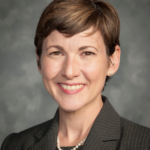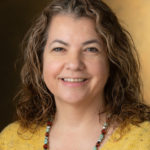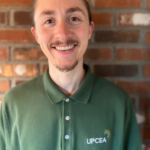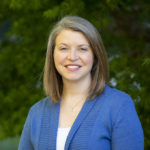When Oregon State University’s Ecampus decided to create an online student advisory council, Executive Director Jessica DuPont knew exactly whom to turn to for guidance: her own classmates.

DuPont and 12 other higher education leaders from across the nation recently completed UPCEA’s inaugural Professional Continuing and Online Leader Certificate program. “They’re my instant network,” she said.
The five-course program “carved out space and accountability for me to move forward some areas of innovation, which can take a backseat when you’re focused on the day-to-day operations,” DuPont said, adding that the weekly virtual sessions provided “a great sense of connection.”
The PCO Leader Certificate program is one of two new online professional development offerings created by UPCEA, the University Professional and Continuing Education Association. The PCO Leader Certificate program is geared for seasoned leaders, while the PCO Professional Certificate program is tailored to early- and mid-career professionals.
“In this field, you’ve got to be growing,” said Jay A. Halfond, faculty director of professional development programs at UPCEA. Halfond, a Boston University professor and former dean, helped conceptualize the courses for both programs and hired the faculty — among the nation’s leading figures in PCO education — who facilitate them. “We are building a broad idea of what leadership means,” he said.
PCO Growing and Evolving
PCO units at universities and colleges have grown and evolved tremendously over the past decade, becoming central to operations at higher education institutions, said Jim Fong, director of UPCEA’s Center for Research and Strategy. With shrinking undergraduate enrollments in traditional degree programs, PCO units are developing innovative offerings that attract adult learners pursuing a degree or upskilling for their career.
“The approach is helping institutions reinvent themselves to be more valuable to businesses,” said Fong, who teaches the marketing course for the PCO Professional Certificate program.
For example, PCO units have taken a lead role in rolling out “stackable models” that allow students to attain credentials en route to greater achievement. Adult learners, especially, “want more results, quicker,” he noted.
The COVID-19 pandemic showcased their value, as PCO units played a crucial role shifting more than 1 million in-person courses online in a matter of days when campuses were forced to close in March 2020. As campuses reopened, elements of online learning that instructors and students found beneficial were incorporated into in-person courses, experts said.
“We need to create a new education model to keep pace,” Fong said. In the spring 2021 semester alone, 727,000 fewer students than the prior year were enrolled in undergraduate programs — a drop of nearly 5%, according to the National Student Clearinghouse. That decline in enrollment is expected to continue, and by 2030, higher education enrollment is predicted to lose 15% of traditional enrollment due to demographics, Fong said.
Supporting Seasoned and Rising Leaders
In UPCEA’s PCO Leader Certificate program, higher education leaders learn how to responsibly manage people, data and ideas, and examine the roles they are likely to have as innovators and ambassadors, as well as educators, Halfond said. The first cohort started in January 2021, taking five, four-week courses in succession to earn the certificate.
The PCO Professional Certificate program teaches participants how to develop educational programs, create financial models and train online faculty, among other skills. The classes are offered year-round and participants can enroll at any time. To achieve the certificate, they must satisfactorily complete five of the 10 course offerings: two foundational courses, two professional practice courses and a fifth in either category.
Participants in both programs earn badges for each course they successfully complete. Coursework in each program requires about five hours a week, including a one-hour virtual class facilitated by an expert in the field, Halfond said. “We know we are dealing with busy professionals,” he said.
Since the PCO Professional Certificate program launched in September 2020, 326 people have taken at least one course, and nearly 200 have taken two or more, said Patrick Flanigan, UPCEA program manager.
Gaining Expertise

Michael Jones, director of finance and operations for the University of Connecticut’s Center for Excellence in Teaching and Learning (CETL), earned both certificates. What he’s learned has helped him evaluate CETL’s operations, build better unity between its 10 units and approach new programming more strategically, Jones said.
“Universities’ PCO units across the nation are so different; none operates the same way,” Jones said. “The program gave me a greater look into how other organizations are organized, what their workflows are, and how we can change ours to be more efficient.”
While Jones said his position at CETL is not exclusively in the PCO field, “the certificates have given me some credentialing that shows I know what I’m talking about, that I’ve done some groundwork to make sure I know the industry well.” For example, Jones said he learned how CETL can better research demand for proposed programs. “We want to vet programs before they launch,” he said.
Jones said he relates to nontraditional students, as he was one himself, attending college while working full-time. He went on to earn an MBA and another master’s degree, and intends to pursue his doctorate in education. The UPCEA professional development certificate programs “are a great stepping-stone for me to discover what I want to pursue,” Jones said.
Networking

Karen Bull, dean of the University of North Carolina Greensboro’s Division of Online Learning, said the PCO Leader Certificate program has been tremendously valuable. “The networking that happens is much deeper than what can occur at a conference; I’ve developed strong professional bonds, and can call or email [peers] if I need help with a problem,” Bull said.
During her time in the program, UNCG Online was developing a noncredit digital certification in e-sports, ahead of the university offering a concentration and minor in e-sports next fall. Bull said she used the discussion period during the weekly virtual class to get classmates’ input for gaining acceptance from the university’s academic side. She is currently developing standards and procedures for course badges university-wide, and has reached out to her fellow cohort members to learn from their experiences.

Shortly after becoming director of the PCO department at Southern Illinois University Edwardsville, Mary Ettling led a soft launch of a name change that met some resistance, she said. Ettling presented the dilemma to her PCO Leader Certificate classmates to garner advice on how to get buy-in on the name and “make sure no other departments felt the name overshadowed their unit’s role within the university,” she said. SIUE’s Office of Online Services and Educational Outreach passed muster.
Beyond the credentials she earned, Ettling said, “what I needed was the work that went behind them, the level of thought that went into achieving them. Being part of that group was very powerful for me.”
Addressing Real-World Problems

Bruce Etter, director of research and consulting at UPCEA, had worked for the organization for seven years when he enrolled in the PCO Professional Certificate program. He said the experience has given him “a broader, more holistic sense” of the PCO field. “The discussions are not just theoretical exercises; we can apply what we’re learning to real-world problems,” Etter said.
More than a half dozen employees of the College of Continuing Education at California State University, Sacramento have already earned the PCO Professional Certificate.

“I grew so much, and my unit grew too because I can contribute more,” said Alessandra McMorris, program manager of academic programs. An UPCEA resource guide on planning new courses that she received in the program helped McMorris develop a new master’s degree offering with the College of Education at Sacramento State. Universal Design for E-Learning is set to launch next September.
Nancy Griggs, the college’s facilities operations analyst, said she learned skills and understanding that have improved communication with colleagues. “I can ask better questions about their needs so operations run more smoothly,” Griggs said.

Allison Shaw is a longtime contract employee at Sacramento State, serving as research analyst for the college’s dean. Shaw said she sees the PCO Professional Certificate as an endorsement of her experience and commitment to ongoing learning.
Shaw said she may at some point seek a full-time staff position and is confident the certification would make her a more attractive candidate. “I’m very good at what I do, and I want my credentials to reflect that,” she said. Shaw noted that the dean is considering making the PCO Professional Certificate program part of the onboarding procedure for new employees.

Mark Jimerson’s job as re-engagement enrollment specialist at Hinds Community College in Mississippi is to reach out to adults who left college before completing a degree, and those who could benefit from upskilling for employment. The PCO Professional Certificate program “really spoke to what I’m doing, the need to meet students where they’re at,” he said. “The program opened my eyes. People need access to continuing education more than ever.”
Jimerson, who is working on a doctorate in educational leadership with a concentration in higher education, said one key skill he learned is using data to advocate for his division. “Always know your stats, so we can share our true story and impact,” he said.
The Value of Badges

Like others, Jimerson is proud to post his UPCEA badges on LinkedIn. “These have been truly impactful because we’re learning what is truly happening in the field right now,” he said.
“Badging is a great way to tell an employer that you’ve earned the skill they require, and that it’s backed by sound objectives and competencies,” Jones noted.
Bull, of UNCG Online, said posting her badges showed “that I’m still evolving and learning, and staying relevant.”
When DuPont joined Oregon State University’s Ecampus in 1998, she was one of a handful of employees. Now there are 100. “Professional, continuing education has evolved incredibly in the past 20 years. I feel like I was catching the wave. It’s been so exciting to be a part of it,” she said.
Beyond the practical information she took away from the PCO Leader Certificate program, DuPont said she also was provided the opportunity to explore her personal growth as a leader, particularly in the final class on responsible leadership.
“I thought a lot about my core values and how they align with the institution’s,” she said. “We talked a lot about ethics and discussed case studies. I really appreciated that lens.”
Margaret McHugh worked for 20 years as a newspaper reporter before launching an independent career, largely promoting nonprofits. Margaret writes for Rutgers University Division of Continuing Studies and other Rutgers’ entities. She has produced and edited content for Atlantic Health System, the ACLU of New Jersey and the New Jersey State Bar Association. She shares a home office with her rescue dog, Ellie.

